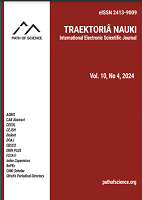“Post-Non-Classical” or “Post-Neoclassical” Epistemology?
“Post-Non-Classical” or “Post-Neoclassical” Epistemology?
Author(s): Turana AlibeyovaSubject(s): Philosophy, Epistemology
Published by: Altezoro, s. r. o. & Dialog
Keywords: classical; non-classical; post-non-classical; neoclassical; postneoclassical; scientific rationality; anthropometric systems; complexity; uncertainty;
Summary/Abstract: The article examines the theoretical, conceptual and methodological relations between scientific rationality, epistemological concepts and types of epistemology. Several relevant philosophical aspects of classifying epistemology into classical, non-classical and postnon-classical types are analysed. It was highlighted that at the current juncture, there are conceptual approaches to the elements above of scientific knowledge acquisition, justification, rationality, knowledge application, and the criteria for its authenticity. In this context, philosophers argue for developing new epistemological frameworks to facilitate an adequate philosophical comprehension of contemporary scientific knowledge. A variety of ideas have been proposed. In addition, there is a need to clarify terminology. Furthermore, philosophers are engaged in a debate regarding the most appropriate terminology to describe modern epistemology. One such debate concerns the merits of designating modern epistemology as "postnon-classical" or "post-neoclassical" about science. The article demonstrates that in addition to these, the norms, rules, boundaries of scientific understanding, the strategy and methodology of scientific activity, the rationality of scientific knowledge, its justification, the criteria of scientific truth and their search logic have been renewed. Researchers have finally designated this innovation as a post-non-classical (or postneoclassical) type of scientific understanding. The article analysed whether modern epistemology is correctly described as "post-non-classical" or "post-neoclassical" from a philosophical perspective. The methodological principles of systematicity, non-linearity, intersubjectivity and synergetic formation were selected for the interdisciplinary approach. System analysis and dynamic integration are employed as methodologies. The scientific novelty is that the modern epistemological situation can be described as either "post-non-classical" or "post-neoclassical," which is related to how scientific understanding has evolved historically. In this context, the distinction between the terms is not a matter of differing interpretations of the underlying processes. This represents a distinct articulation of analogous concepts.
Journal: Traektoriâ Nauki
- Issue Year: 10/2024
- Issue No: 5
- Page Range: 6001-6009
- Page Count: 9
- Language: English

